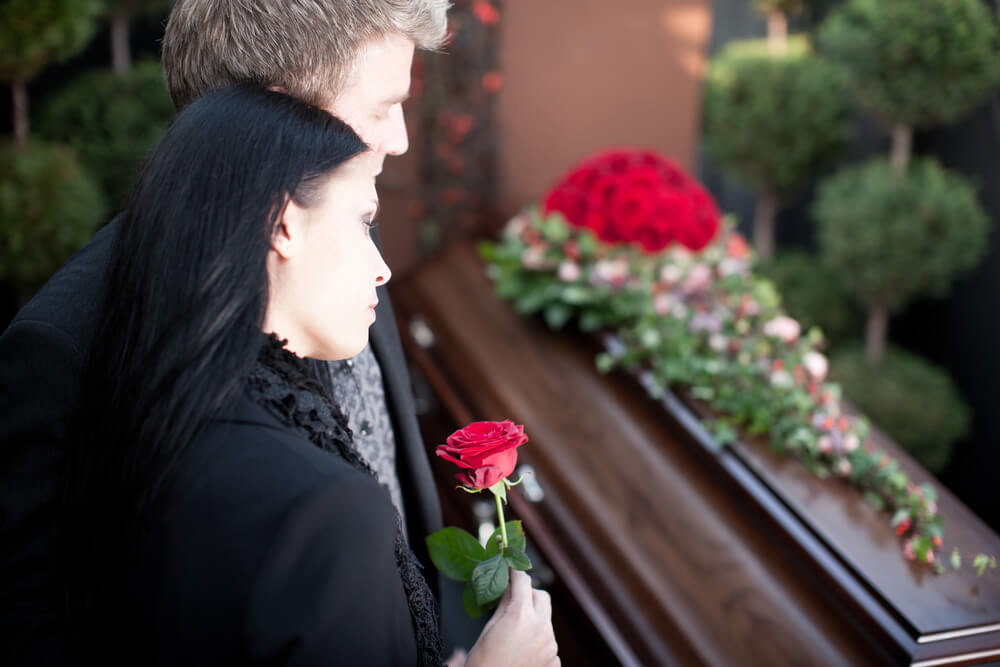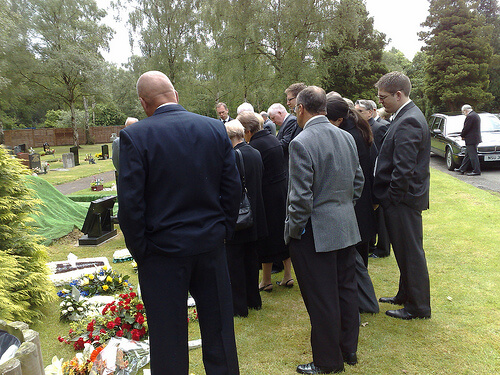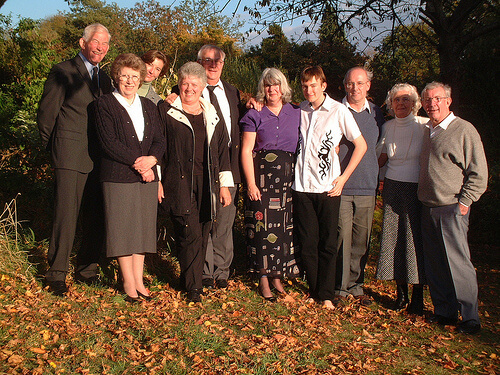When a person dies it is traditional for their family or close friends to plan a funeral for them. A funeral is an event that loved ones of the deceased use as their way to say goodbye to the person and mourn their loss. Over the last few years there has been a growing trend for individuals to plan celebrations of life instead of traditional funerals, usually at the request of the deceased in their will.
Funerals are usually seen as an event for mourning and final goodbyes, whereas life celebrations are seen as uplifting events that celebrate the life of the deceased and their achievements.
Image source: https://farm3.staticflickr.com/2386/2532727091_9f679fb8cd.jpg
It is believed that many people are motivated to choose life celebrations over traditional funerals due to the fact that funerals are often seen as a depressing event that keeps people in the realm of sadness. Celebrations of life, on the other hand, reflect on positive things and are believed to help people hand the death of their loved one more effectively.
In this article we will explain the key differences between traditional funerals and life celebrations.
Intended emotions
Whereas funerals have long been associated with mourning and sorrow, life celebrations are designed to focus on joy and gratitude for the life of the deceased. This difference in the intended emotions is often what sways individuals’ decision to ask their families to plan life celebrations after their death, rather than a traditional funeral.
Having said this, over the years funerals have moved away from being the dark and sombre occasions they once were. Today many people blend traditional funerals with contemporary elements of life celebrations to create a personalised and colourful event that captures the personality of their deceased love one.
Structure of the event
Another key difference between traditional funerals and contemporary life celebrations is the structure of the events. Life celebrations are a contemporary version of memorial services. They are usually free of format and tradition, with celebration being the main intent. Families and friends usually gather together to share stories and look at photos and memorabilia of their loved one. It is also common for families to request charitable donations as opposed to funeral flowers from guests.
Traditional funeral services are far more structured. They usually combine religious and spiritual elements, depending on the beliefs of the deceased. There are various traditions and customs associated with funerals, many of which are still alive and thriving in the UK today.
Presence of the body
A defining difference between funerals and life celebrations is the presence of the body. At funerals the body is usually present and displayed in an open or closed casket (depending on the preference of the family and their religious beliefs). At a life celebration the body of the deceased is absent. This means that the event can take place at any time after the person’s death and there are not any restrictions on the location.
Something that has also become more popular over the years is end of life celebrations. This event takes place when the person is still alive. These events are usually intended for people that are terminally ill and know they will be dying soon. End of life celebrations usually involve the gathering of friends and family. The celebration can be a wonderful thing for the person that is dying, as well as their family and friends. It allows them to celebrate the life and achievements of the individual, as well as get everyone in the same room, possibly for the last time.
Location of event
Generally speaking, traditional funeral services are usually held either in places of worship or funeral homes. This usually depends on the religious beliefs of the deceased. A key difference between funerals and life celebrations is that the latter can be held anywhere. Many people choose to host life celebrations at the family home, although another lovely idea is to host them at a place the deceased loved to visit. This could be anywhere from a beach to a park, lake or even a mountain!
Life celebrations can be hosted almost anywhere, however many people choose to host them at their loved one’s favourite place.
Image source: https://farm9.staticflickr.com/8083/8264140786_3bbd9bd658.jpg
Arranging a funeral or celebration of life
Making funeral arrangements for a loved one’s passing or pre-planning your own funeral can be an overwhelming task. In order to make planning a little easier, it is a good idea to ask yourself what type of event the deceased or if pre-planning, you, would like. If the deceased held traditional values or was religious, it is likely that they would want a traditional funeral, however many individuals include specific details in their will.
Although people tend to either opt for a funeral or a life celebration, there is no reason why you cannot combine elements of the two to plan a truly personal and special event. Funeral directors keep up to date with trends and are therefore aware of the fact that many individuals are looking to plan contemporary celebrations as opposed to traditional funerals. Any good funeral director will accommodate your request and help you plan a special event that will reflect the life of the deceased and everything they stood for.
Conclusion
Although there are key differences between funerals and life celebrations, they should not be seen as an ‘either /or’ option. As long as you plan an event that pays respect to the deceased and is something they would have been pleased with, it does not matter whether you call the event a funeral, memorial service or a life celebration.



